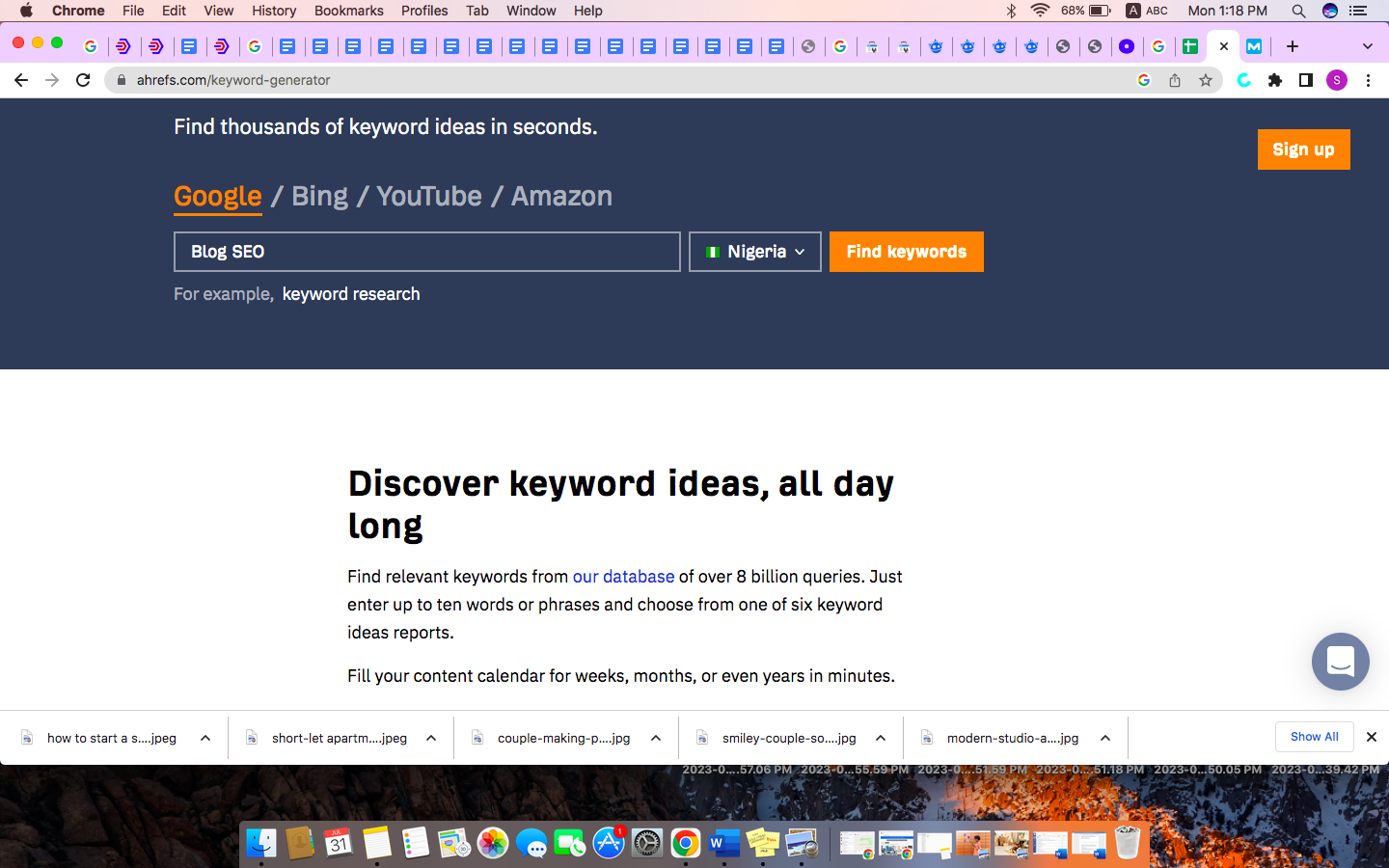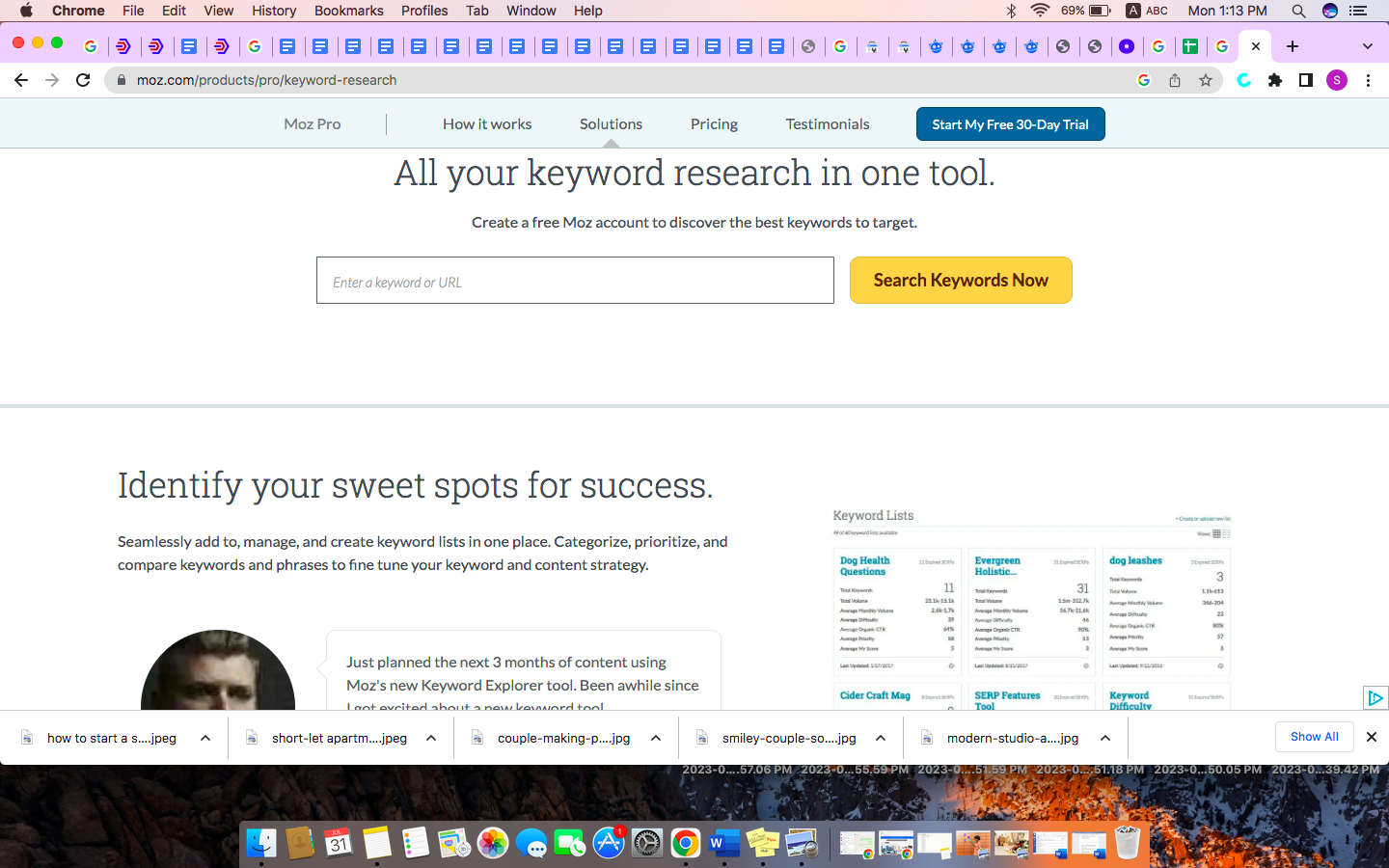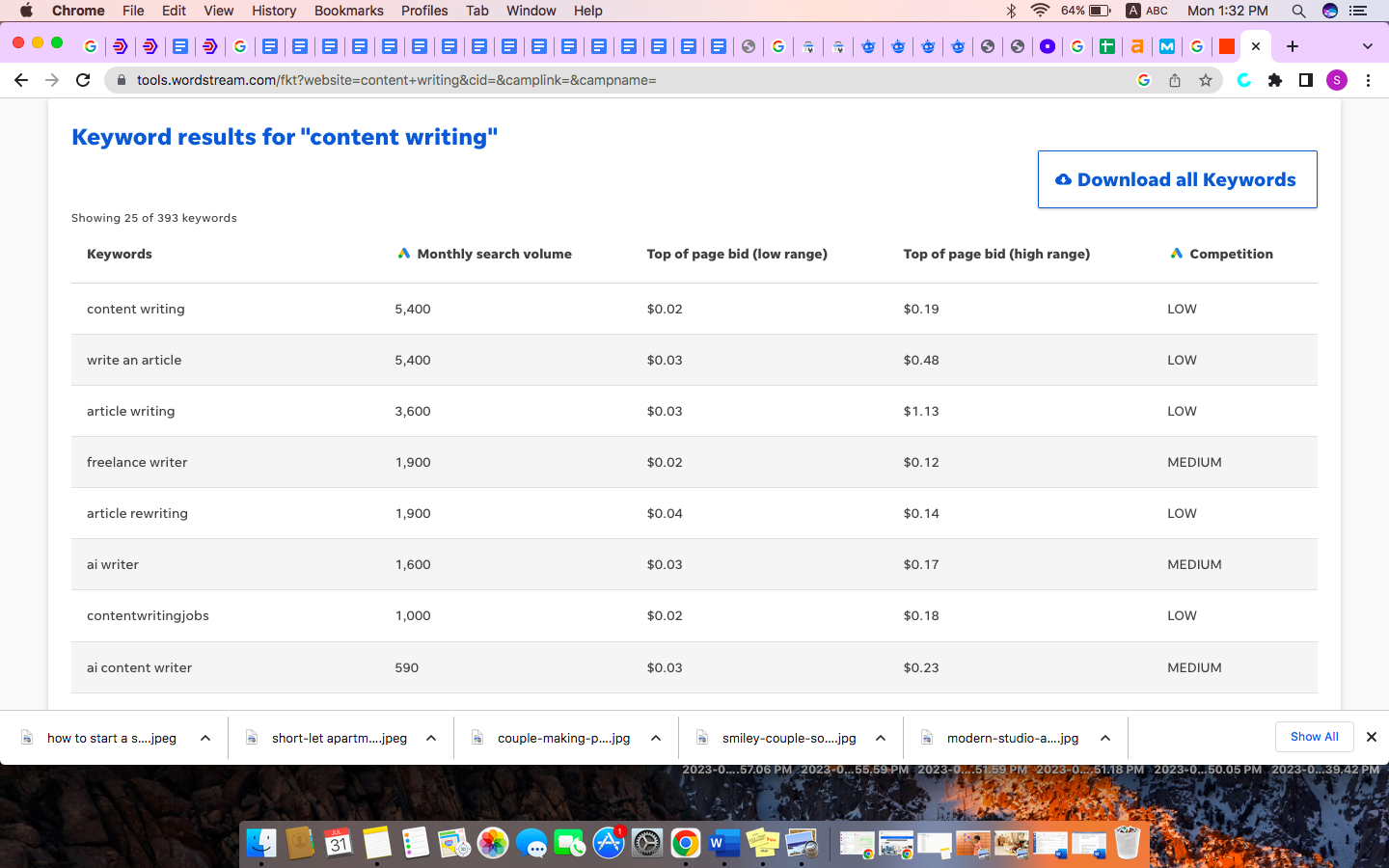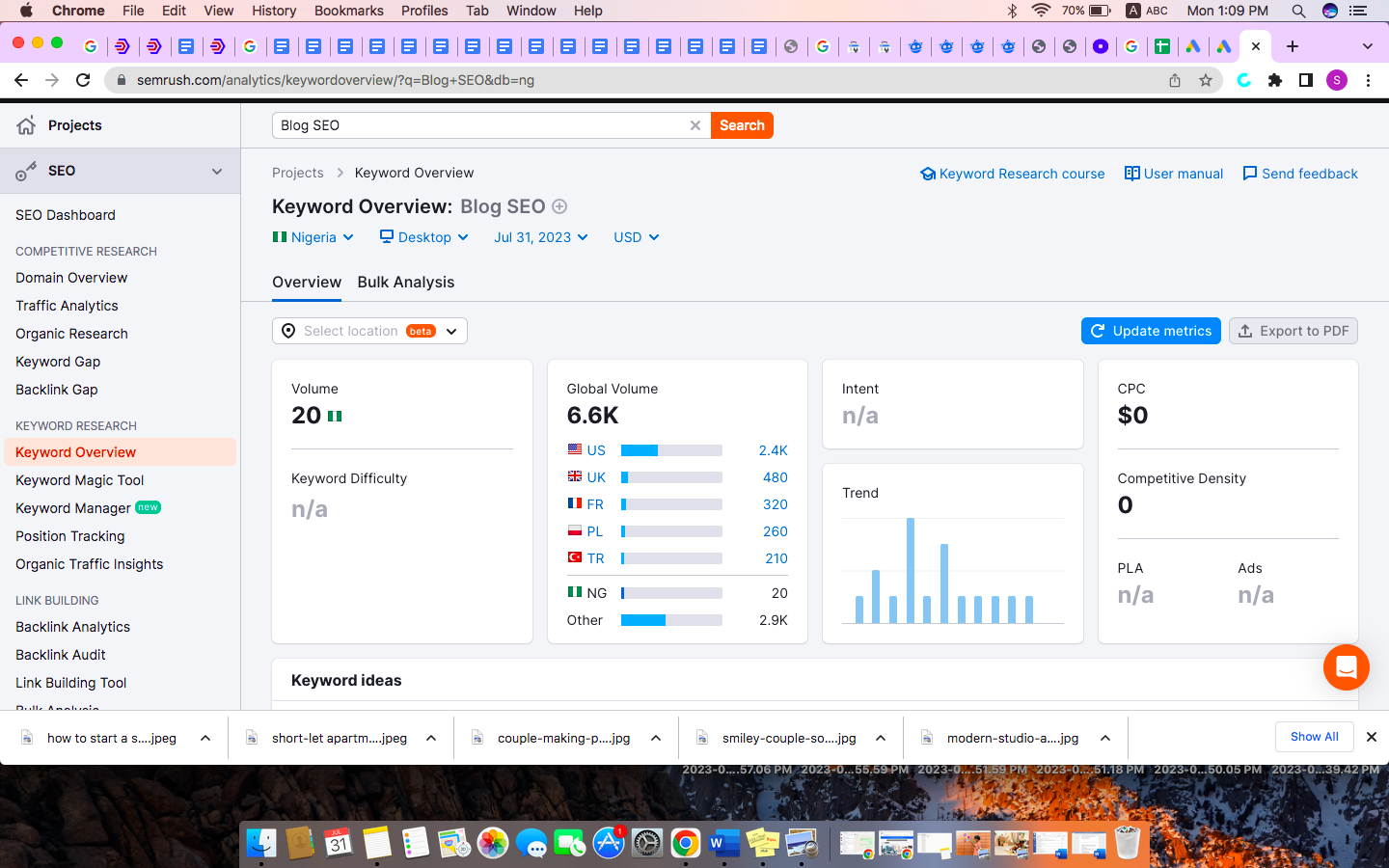Blog SEO is one of the ever relevant SEO strategies that every successful marketer has learned to adopt and maximize in this technology age. As a blogger or marketer, ensuring that your content ranks well in search engines is crucial for driving organic traffic and increasing visibility.
In this guide, we’ll explore effective strategies and best practices to help you optimize your blog post for search engines and boost its chances of ranking higher in search engine results page.
Ready? Then, let’s dive in to uncover the secrets to a successful SEO-friendly blog post starting with the definition of blog optimization.
What is Blog Optimization?
Blog optimization or Blog SEO Writing is the process of fine-tuning and improving a blog’s content, structure, and elements to enhance its visibility and user experience.
The primary goal of blog optimization or Blog SEO writing is to attract more organic traffic from search engines, engage readers, and ultimately achieve specific objectives, such as increasing conversions or driving revenue.
How do I find keywords for my blog SEO?
The number of keywords you should use in a blog post is based on the target keyword and other phrases associated with the topic. However, according to Yoast SEO, you should have your keywords littered across your content in not less than ten times.
Get 50% Discount to Master ALL Aspects of Digital Marketing That Can Earn You $2,500 - $5,000 a month (Even if you are a complete beginner!)
Our students that intentionally implement what they learn from our digital marketing course make back the entire course fee within a single month or more after completing our course because our course gives them many income generating options with unlimited earning potential with no age or location barrier. The best part is no technical skills are required.
An opportunity to change your lifestyle and make money working from anywhere in the world. The results our students get from our digital marketing course prove this could be applied to any market or country and that it is designed for any skill level and work background.
*By signing up, you agree to our privacy policy and terms of service.
To find keywords for your blog SEO, you can follow these steps:
Understand Your Target Audience
Start by identifying your target audience and understanding their interests, needs, and search behaviour. Consider what topics or questions they might be searching for that are related to your blog’s niche or focus.
Brainstorm Relevant Topics
Make a list of broad topics that are relevant to your blog’s content. These topics will serve as a starting point for finding specific keywords.
Use Keyword Research Tools
Utilize keyword research tools to find specific keywords and phrases related to the topics you identified. Some popular tools include Google Keyword Planner, SEMrush, Ahrefs, and Moz Keyword Explorer.
Check Search Volume and Competition
When using keyword research tools, pay attention to the search volume and competition for each keyword. Aim for keywords with a decent search volume and moderate competition to increase your chances of ranking well in search results.
Long-Tail Keywords
When doing keyword research, consider using long-tail keywords, which are longer and more specific phrases. Long-tail keywords can be easier to rank for and are often associated with more focused search intent.
Analyze Competitor Blogs
Look at blogs in your niche that are performing well in search results. Then, analyze their content and identify the keywords they are targeting. This can give you insights into relevant keywords and content ideas.
Use Google Search Suggestions
When you start typing a query in Google’s search bar, it suggests related searches. These suggestions can provide ideas for popular search queries related to your blog’s content.
Consider User Intent
Focus on keywords that align with the user’s intent. Are they looking for information, products, services, or answers to specific questions? Understanding user intent will help you create content that matches what users are looking for.
Regularly Review and Update Keywords
Keep in mind that keyword trends can change over time. Regularly review your keyword list and update it based on changing search patterns and your blog’s performance.
Blog Keyword Generator: 4 Best Keyword Research Tools You Need
Why is Blog SEO important?
Blog SEO is important for several reasons, here are some vital ones:
Increased Organic Traffic
Implementing SEO strategies in your blog helps improve its visibility in search engine results. When your blog ranks higher for relevant keywords, it attracts more organic traffic from users actively searching for information related to your content.
Targeted Audience
SEO allows you to target specific keywords and topics that align with your blog’s niche and the interests of your target audience. This ensures that the right people find your content, increasing the chances of engagement and conversions.
Brand Visibility and Authority
Higher search engine rankings increase your blog’s visibility, making it more likely to be noticed by a broader audience. As your blog gains authority in search results, it builds trust and credibility among users, establishing your brand as a reliable source of information.
Better User Experience
SEO practices often go hand in hand with improving the user experience. By optimizing your blog’s structure, readability, and mobile-friendliness, you create a better overall experience for visitors, leading to increased engagement and longer on-page visits.
Long-term Benefits
Unlike paid advertising, which stops generating traffic once you stop paying, SEO can provide long-term benefits. If you consistently optimize your blog for relevant keywords, your content can continue to attract organic traffic over time.
Cost-Effectiveness
SEO can be a cost-effective way to attract traffic and potential customers to your blog. While it requires effort and time, the results can be substantial compared to investing in paid advertising.
Competitive Edge
In a crowded online space, blogs that rank higher in search results have a competitive advantage. By employing effective SEO strategies, you can stand out from competitors and gain a larger share of organic traffic in your niche.
Increased Conversions and Revenue
When your blog attracts the right audience through SEO, it increases the likelihood of conversions. Whether your goal is to drive sales, subscriptions, or leads, SEO-optimized content can contribute to higher conversion rates and revenue.
Insights for Content Creation
SEO research can provide valuable insights into the topics, keywords, and questions that your target audience is interested in. This information can guide your content creation strategy, ensuring that you produce valuable and relevant content.
Blog SEO tips: How to optimize my blog for search engines
Blog optimization is the easiest way to rank your blog on Google or any other search engine like Bing, Baidu, etc. Optimizing your blog for search engines can significantly improve its visibility and attract more organic traffic. Here are some essential blog SEO tips to help you get started:
Keyword Research
Conduct thorough keyword research to identify relevant and high-traffic keywords related to your blog’s topics. Use tools like Google Keyword Planner, Ahrefs, or SEMrush to find valuable keywords to target in your content.
Quality Content
Create high-quality, informative, and engaging content that resonates with your target audience. Focus on providing value and addressing their needs to encourage longer on-page visits and lower bounce rates.
On-Page SEO
On-Page SEO involves optimizing your blog posts for search engines by incorporating target keywords in the title, headings, meta description, and throughout the content. However, avoid keyword stuffing, as it can negatively affect your rankings.
Readability and Formatting
Ensure that your content is easy to read and understand. Use clear headings, subheadings, bullet points, and short paragraphs to improve readability.
Internal Linking
Include relevant internal links in your blog posts to guide readers to other related content on your blog. This not only helps with SEO but also encourages users to explore more of your website.
Mobile-Friendly Design
Ensure that your blog is optimized for mobile devices. A significant portion of internet users access content through mobile devices, so mobile-friendly design is essential for a positive user experience.
Page Loading Speed
Improve your blog’s page loading speed to reduce bounce rates and improve user experience. Compress images, use caching, and choose a reliable hosting provider to enhance loading times.
Use Descriptive URLs
Create descriptive and keyword-rich URLs for your blog posts. Avoid using generic URLs with random numbers or characters.
Meta Tags and Descriptions
While optimizing your blog post or about to publish one, ensure to write compelling meta titles and descriptions for your blog posts. These elements appear in search engine results and can influence click-through rates.
Image Optimization
For you to experience better results, optimize images on your blog by compressing them without compromising quality. Use descriptive alt text for accessibility and search engine crawlers.
Social Sharing
Include social media sharing buttons to encourage readers to share your blog posts on their social networks. Increased social shares can lead to more visibility and potential backlinks.
Regularly Update Content
Always ensure that your blog content is fresh and relevant by updating older posts with new information. Search engines tend to favour up-to-date and valuable content.
Monitor Analytics
Use tools like Google Analytics to track your blog’s performance. You can also analyze traffic sources, user behavior, and popular content to refine your SEO strategy.
4 Blog Optimization Tools in 2023
There are several blog optimization tools that can help you improve your blog’s SEO and performance. Here are four tools that you might find useful:
SEMrush
SEMrush is an all-in-one SEO and digital marketing tool that provides comprehensive features for keyword research, competitor analysis, site auditing, backlink analysis, and more. Also, it helps you identify valuable keywords, track your blog’s rankings, and optimize your content for better search engine visibility.
Yoast SEO
Yoast SEO is a popular WordPress plugin that assists in on-page SEO optimization. It offers real-time content analysis, suggests relevant keywords, and helps you optimize meta tags, headings, and content structure for improved search engine rankings.
Google Analytics
Google Analytics is a powerful web analytics tool that provides valuable insights into your blog’s performance. Some of its major features are tracking website traffic, user behavior, conversion rates, and other key metrics. All help you to understand your audience and make data-driven decisions while optimizing your blog’s content and user experience.
Moz Pro
Moz Pro is an SEO toolset that offers various features to improve your blog’s search engine rankings. This includes keyword research, site audits, backlink analysis, rank tracking, and on-page optimization suggestions. All are designed to help you optimize your blog for better SEO performance.
FREQUENTLY ASKED QUESTIONS
How to do SEO analysis of a blog?
Content analysis for SEO has always revolve around achieving your goals of driving more revenue through your content. While this can be accomplished by focusing on two main aspects: increasing traffic and increasing conversions, there are crucial steps required.
To boost traffic to your blog, here are some crucial steps to take:
Conducting keyword research and analysis
Keywords are the words or phrases people use when searching online, and they play a key role in attracting organic search traffic to your website. Analyzing both short-tail (one or two words) and long-tail (three or more words) keywords helps identify the ones most likely to bring relevant traffic. This insight allows you to optimize your content accordingly and explore new content ideas based on related topics and phrases users are searching for.
Improving readability
This is another vital factor in content analysis. Ensuring that your written content is easy to understand through sentence structure and word choice enhances the user experience. This is especially important for reaching audiences with limited knowledge in the subject matter. By using readability score meters like Yoast SEO, you can enhance accessibility for a broader audience, potentially leading to increased traffic and conversions.
Analyzing your backlink and internal link
Backlinks and internal links are essential for successful content analysis. Hence, the adoption of backlinks from other websites and internal links within your site can positively impact organic search rankings and build trust with potential customers. Identifying opportunities for improvement in these can maximize your content’s visibility and conversion potential.
Click-through-rate optimization
Lastly, optimizing click-through rates (CTRs) is crucial in content analysis. CTRs measure how often users click on your content in search results. By crafting attention-grabbing titles and meta descriptions, you can increase the likelihood of enticing more users to visit your website. This practice also provides valuable insights into which titles and descriptions work best with your audience, helping you refine your SEO strategy.
Do you need SEO for a blog? Are blogs still relevant in 2023?
Certainly! Blogging remains a relevant medium. Its relevance and profitability are expected to persist well into the future. However, to make the most of it, you must adjust to the evolving ways people search, engage, and consume online content. Embrace these changes and seize the opportunity to start your own blog today!
CONCLUSION
Start optimizing your blog post. Henceforth, you should view blogging and SEO as inseparable if your content will truly fulfill the intended purpose – meet the needs of users using search terms that are your focus keyword on search engines.
Practicing these tips can help enhance your blog’s visibility in search engine results, attract more organic traffic, and improve your user experience. Remember that SEO is an ongoing process, so you will need consistent efforts to yield better results over time.






